Fly fishing in saltwater is an exhilarating experience, but it can take a toll on your gear. The corrosive nature of saltwater can lead to salt buildup, rust, and corrosion on your fly reels, jeopardizing their performance and longevity. To ensure your fly reels stay in top shape and continue to perform flawlessly, proper maintenance is essential. By implementing effective techniques, you can prevent saltwater corrosion and enjoy many successful saltwater fly fishing trips.
Key Takeaways:
- Regular maintenance is crucial for preventing saltwater corrosion on fly reels.
- Rinse your fly reel with freshwater after each saltwater fishing trip to remove salt buildup and contaminants.
- Thoroughly dry your fly reel and rod to prevent trapped water and corrosion.
- Consider using a soapy solution, or plain freshwater, when cleaning your fly reel, depending on the level of contamination.
- Develop a maintenance schedule and use high-quality lubricants to protect your fly reel from saltwater corrosion.
Importance of Freshwater Rinsing
When it comes to preventing saltwater corrosion on fly reels, freshwater rinsing is a crucial step in fly reel maintenance. After every saltwater fishing trip, it is essential to rinse your fly reel with freshwater. This simple yet effective technique helps protect your reel from salt buildup, corrosion, and damage that can compromise its functionality and lifespan.
Freshwater rinsing plays a vital role in removing salt, grime, and sand that tend to accumulate on the reel during saltwater fishing. The saltwater environment poses a significant risk to the metal components of your fly reel, making regular rinsing a necessary part of your maintenance routine. By rinsing your fly reel with freshwater, you can effectively flush out these contaminants and prevent them from causing corrosion and other issues.
Not only does freshwater rinsing help maintain the performance and longevity of your fly reel, but it also contributes to a smoother fishing experience. By keeping your fly reel clean and free from salt and debris, you ensure that it functions at its best, allowing for seamless line retrieval and casting.
Benefits of Freshwater Rinsing:
- Prevents saltwater corrosion on fly reels
- Protects the functionality and performance of your fly reel
- Removes salt buildup, grime, and sand that can damage your reel
- Helps maintain smooth line retrieval and casting
To emphasize the importance of freshwater rinsing in preventing saltwater corrosion, consider the following quote:
“Regular freshwater rinsing is a simple yet indispensable practice for fly anglers. It helps protect the reel from harmful salt buildup, prolonging the life of the gear and ensuring reliable performance.” – Fly Fishing Pro
By incorporating freshwater rinsing into your fly reel maintenance routine, you can effectively prevent saltwater corrosion and extend the lifespan of your gear. So after your next saltwater fishing adventure, make sure to give your fly reel a thorough freshwater rinse.
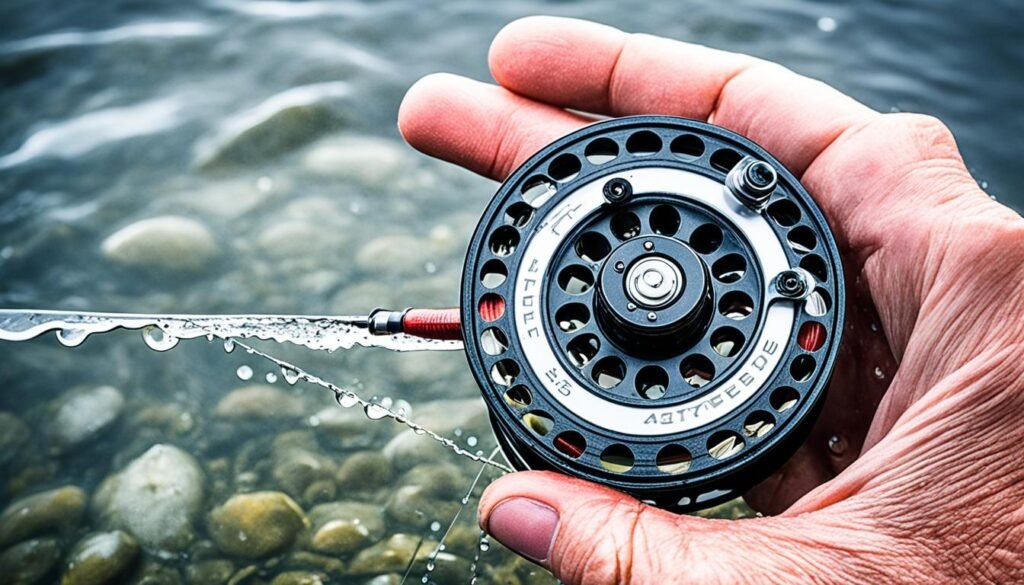
| Benefits of Freshwater Rinsing | Summary |
|---|---|
| Prevents saltwater corrosion on fly reels | Freshwater rinsing effectively removes salt buildup, protecting the reel from corrosion and damage. |
| Protects the functionality and performance of your fly reel | By rinsing with freshwater, you ensure that your reel operates smoothly and maintains optimal performance. |
| Removes salt buildup, grime, and sand that can damage your reel | The contaminants that accumulate during saltwater fishing are flushed out, preventing potential damage to the reel. |
| Helps maintain smooth line retrieval and casting | With a clean and well-maintained reel, you can enjoy seamless line retrieval and casting during your fishing trips. |
Proper Fly Rod Rinsing Techniques
When it comes to maintaining your fly rod in saltwater, proper rinsing techniques are essential. Paying close attention to specific areas of the rod can help protect it from salt, grime, and sand buildup, ensuring its longevity and optimal performance.
One crucial area to focus on is the ferrules, where the rod sections join together. These areas are particularly vulnerable to corrosion and damage from saltwater exposure. Thoroughly rinsing the ferrules with freshwater after each saltwater fishing trip is crucial for preventing salt buildup and maintaining the functionality of the rod.
Another important area to consider is the reel seat. Salt, grime, and sand can accumulate around the reel seat, potentially leading to corrosion and affecting the reel’s stability. By separating the rod sections and thoroughly rinsing each part, including the reel seat, with freshwater, you can effectively remove any contaminants that may have accumulated.
To illustrate this, below is a table summarizing the proper fly rod rinsing techniques:
| Rinsing Technique | Description |
|---|---|
| Thoroughly Rinse Ferrules | Use freshwater to clean the ferrules, focusing on removing any salt, grime, or sand that may be present. |
| Rinse Reel Seat | Separate the rod sections and rinse the reel seat with freshwater, ensuring the removal of any salt or contaminants. |
By following these proper fly rod rinsing techniques, you can protect your fly reel from saltwater corrosion and maintain its performance for years to come.
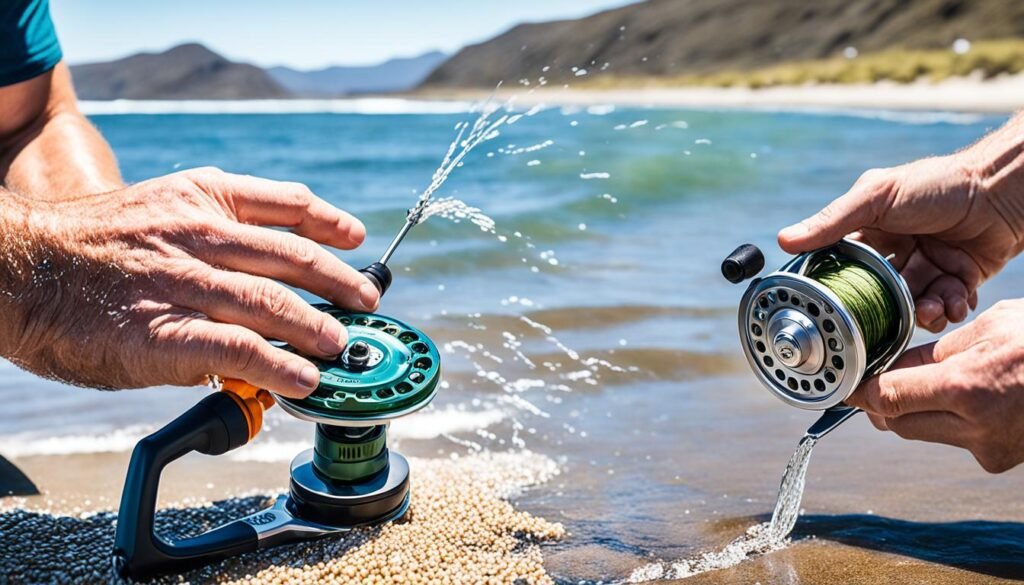
Note: Always be cautious when handling your fly rod to prevent any unnecessary stress or damage to the components.
Drying Your Fly Reel and Rod
After rinsing with freshwater, it is essential to dry your fly reel and rod thoroughly to prevent corrosion and maintain their performance. Here are some steps to ensure proper drying:
- 1. Use a towel to gently remove any excess water from the reel and rod.
- 2. Find a clean and dry area indoors to continue the drying process.
- 3. Separate the reel parts to allow any trapped water to escape. Wipe each part individually with a dry towel.
- 4. Prop the rod sections up against a wall or rod holder, allowing any remaining water to drip out.
By thoroughly drying your fly reel and rod, you minimize the risk of corrosion and ensure they stay in optimal condition for your next saltwater fly fishing adventure.
| Drying Steps | Description |
|---|---|
| 1. Use a towel | Gently remove excess water from the reel and rod. |
| 2. Find a clean and dry area indoors | Choose a place where the gear can continue drying without the risk of exposure to moisture. |
| 3. Separate the reel parts | Allow trapped water to escape and wipe each part with a dry towel. |
| 4. Prop the rod sections up | Position the rod sections against a wall or rod holder to allow water to drip out. |
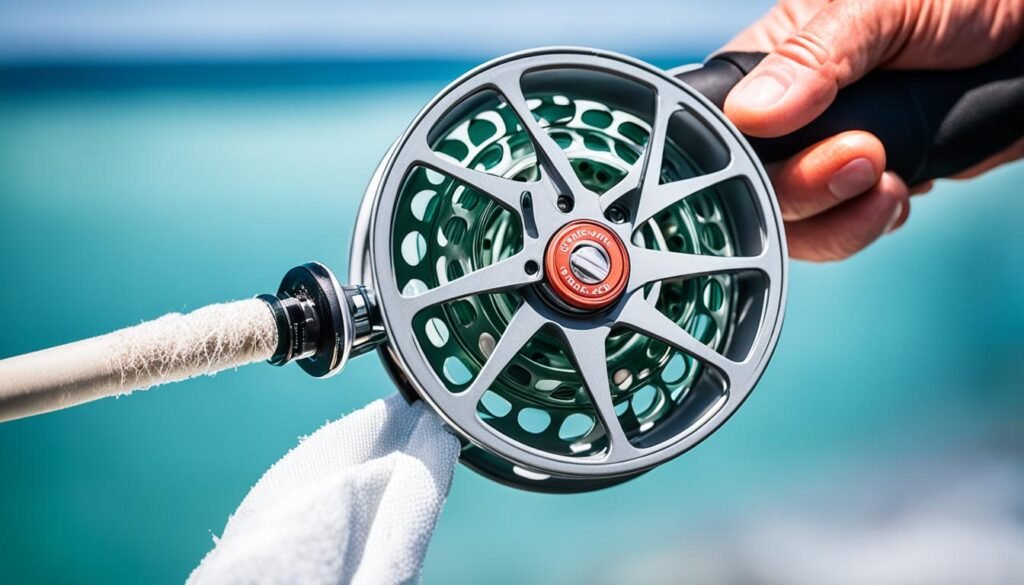
The Role of Soapy Solution in Cleaning
When it comes to preventing saltwater corrosion on fly reels, anglers have different approaches. Some prefer using a soapy solution while cleaning their gear, while others find plain freshwater rinsing to be sufficient. Let’s explore the role of a soapy solution and how it can be one of the best anti-corrosion techniques for fly reels.
Using a soapy solution can be an effective way to break down salt and contaminants that may have accumulated on your fly reel during saltwater fishing trips. The soap helps to dissolve and remove these substances effectively, leaving your reel clean and corrosion-free. However, it’s important to note that using a soapy solution is not always necessary, especially if your reel has minimal contamination.
Plain freshwater rinsing can often be enough to clean your fly reel and prevent saltwater corrosion. By thoroughly rinsing your reel with freshwater, you can remove most of the salt buildup and other contaminants that may have accumulated. This simple technique is easy to perform and can be just as effective in maintaining your gear’s performance.
Choosing the Right Cleaning Method
The choice between using a soapy solution or plain freshwater ultimately depends on personal preference and the level of contamination on your fly reel. If you notice significant salt buildup or stubborn contaminants, using a soapy solution can provide a deeper clean. On the other hand, if your reel has minimal contamination, plain freshwater rinsing should suffice.
Regardless of the cleaning method you choose, it’s crucial to thoroughly rinse your reel with freshwater after using a soapy solution or to remove any traces of soap. Residual soap can attract dirt and grime, leading to potential issues down the line.
Remember, maintaining your fly reel is vital for its longevity and performance. Regular cleaning using the appropriate techniques, whether it’s with a soapy solution or plain freshwater, is key to preventing saltwater corrosion and ensuring your gear stays in excellent condition.
A proper cleaning routine, along with other maintenance practices like drying your reel thoroughly after rinsing and using high-quality lubricants, can help protect your fly reel from saltwater corrosion. By implementing these best practices, you’ll be able to enjoy many successful and corrosion-free fly fishing adventures.
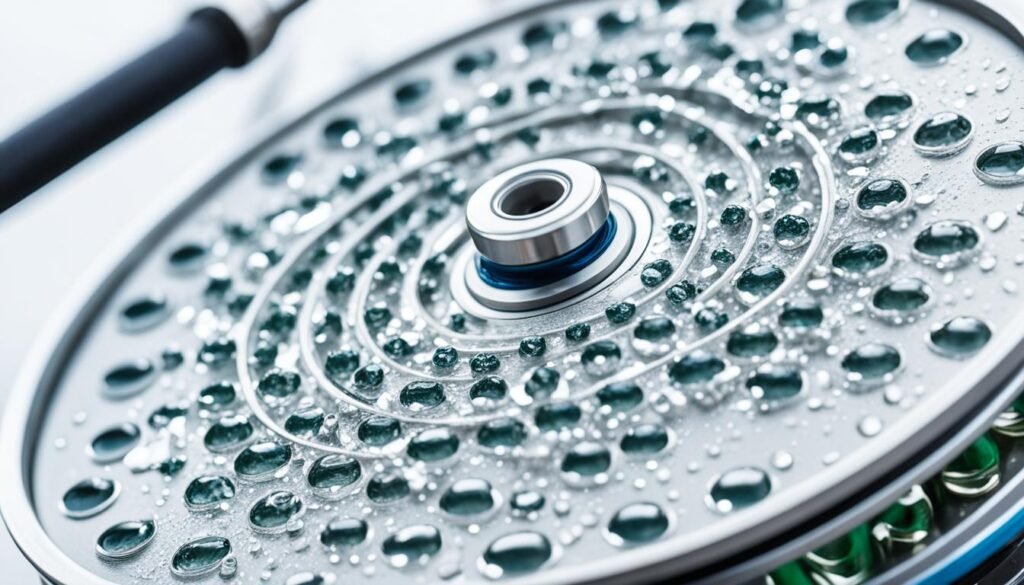
Extending the Life of Fishing Tackle
Regular maintenance is key to extending the life of your fishing tackle. By taking proper care of your gear, you can prevent corrosion and ensure that it stays in optimal condition for years to come.
After every saltwater fishing trip, it is essential to rinse all your gear, including your fly fishing reels, rods, and terminal tackle, with freshwater. This simple step helps remove any salt and other contaminants that can lead to corrosion. Pay extra attention to areas such as reel seats and ferrules, where salt, grime, and sand can accumulate.
In addition to rinsing, consider keeping a service log to track the maintenance tasks you’ve performed on your gear. This allows you to keep a record of when it was last cleaned or lubricated, ensuring that you stay on top of maintenance schedules and prevent any unnecessary wear and tear.
When it comes to lubrication, be sure to use high-quality lubricants specifically designed for saltwater applications. These lubricants not only provide excellent corrosion protection but also ensure smooth reel operation. Apply lubricant to the reel’s internal components and moving parts, following the manufacturer’s instructions for best results.
Remember: Prevention is always better than repair. By implementing these corrosion prevention tips and regularly maintaining your fly fishing reels, you can significantly extend the life of your fishing tackle, ensuring that it remains in top-notch condition for your next saltwater adventure.
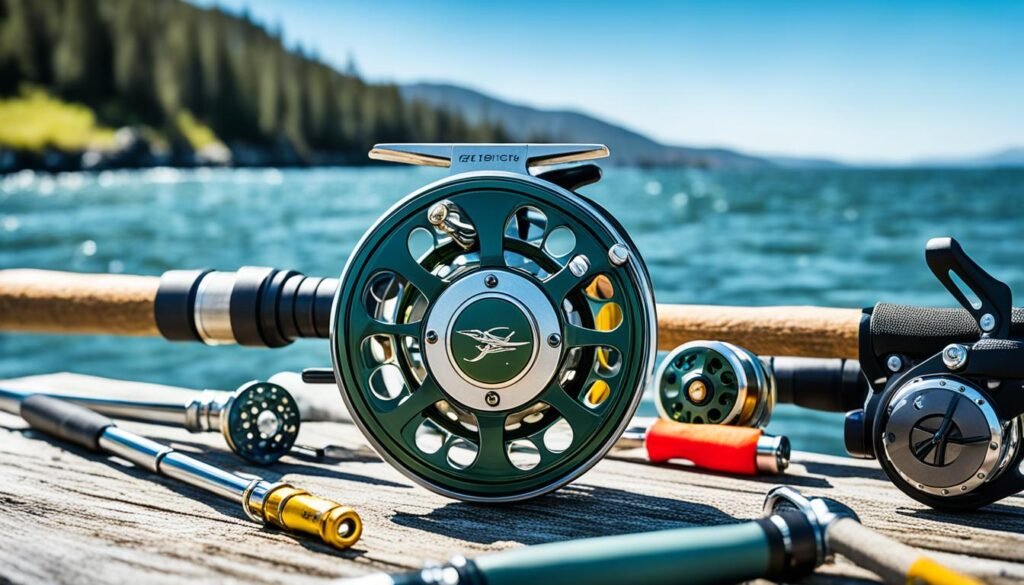
Washing Rods to Prevent Corrosion
After a thrilling saltwater fishing session, it’s crucial to give your fly rod some much-needed attention. Proper maintenance is essential to protect your rod from saltwater corrosion, ensuring its longevity and optimal performance. Neglecting to clean your rod can lead to corrosion on the guides and reel seats, compromising its functionality over time.
To prevent corrosion and maintain your fly rod’s pristine condition, it’s recommended to wash it thoroughly with soap and fresh water after each saltwater fishing trip. This process removes any salty residue, grime, or other contaminants that may have accumulated during your outing.
When washing your fly rod, pay close attention to every component, including the guides, reel seat, and rod sock. Clean each part separately, ensuring that no salt residue remains to contaminate the freshly cleaned rod. By including the rod sock in the cleaning process, you actively prevent any lingering salt from affecting your rod later on.
To wash your rod effectively, follow these steps:
- Separate the Rod Sections: Carefully detach the rod sections from each other, ensuring you have a clear view of all parts.
- Apply Mild Soap: Gently apply a mild soap solution to a clean cloth or sponge, creating lather for effective cleaning. Avoid using harsh detergents or abrasive cleaners that can damage the rod’s finish.
- Scrub the Guides and Reel Seat: Use the soapy cloth or sponge to scrub the guides and reel seat, removing any salt, dirt, or debris. Pay attention to hard-to-reach areas and ensure a thorough clean.
- Rinse with Fresh Water: Rinse each rod section with fresh water, eliminating any soap residue. This step ensures the rod is free from any cleaning agents that could potentially harm its material.
- Dry Thoroughly: After rinsing, use a clean, dry towel to remove excess water from the rod. Place the rod sections in a well-ventilated area and allow them to air dry completely.
By following these steps and incorporating regular rod maintenance into your fishing routine, you can effectively protect your fly rod from saltwater corrosion, extending its lifespan and ensuring many successful fishing adventures to come.
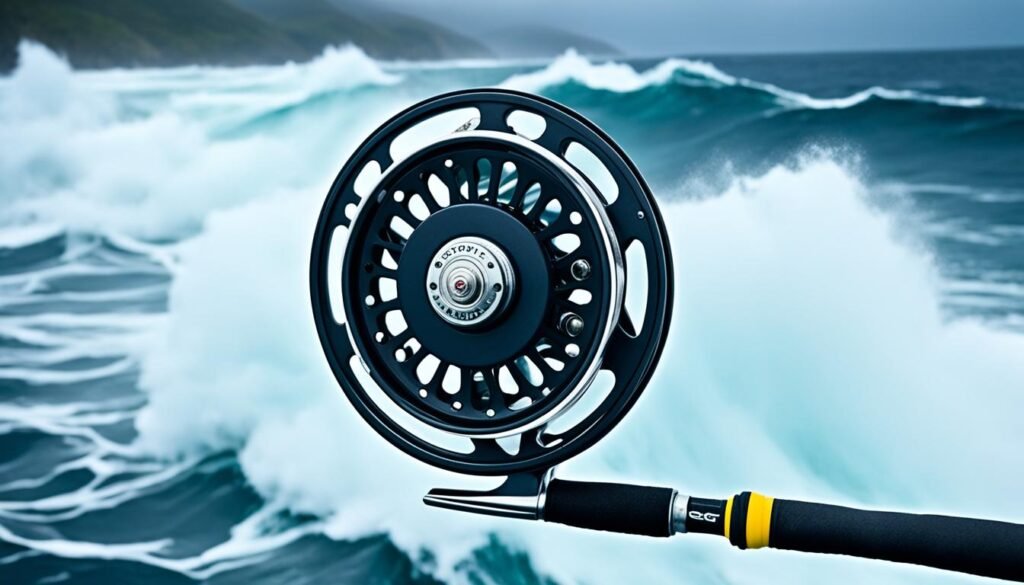
The Importance of Good Maintenance
Good maintenance practices are essential for keeping your fly reel in perfect working order. By implementing regular cleaning and lubrication, you can prevent saltwater corrosion on fly reels and ensure optimal performance. Developing a maintenance schedule and using high-quality lubricants with anti-corrosion properties are key to preserving the longevity of your fly reel.
Regular cleaning is crucial to remove salt, grime, and other contaminants that can lead to corrosion. By rinsing your fly reel with freshwater after each saltwater fishing trip, you can effectively eliminate any buildup and protect the reel’s components.
Additionally, lubrication plays a vital role in preventing corrosion and maintaining the smooth operation of your fly reel. Applying a thin layer of high-quality lubricant to the reel’s moving parts helps reduce friction and repel moisture, further safeguarding against saltwater damage.
Creating a maintenance schedule ensures that you consistently prioritize the care of your fly reel. Set regular intervals for cleaning, inspecting, and lubricating your reel based on your usage frequency and the environmental conditions you encounter.
Proper Fly Reel Cleaning Process:
- Start by disassembling the reel according to the manufacturer’s instructions.
- Thoroughly rinse each component with freshwater to remove any salt and debris.
- Gently scrub the reel’s surfaces with a soft-bristled brush or cloth to remove stubborn grime.
- Dry the components thoroughly using a towel or air drying them in a clean and well-ventilated area.
- Apply a small amount of lubricant to the appropriate areas, following the reel’s manual or manufacturer’s recommendations.
- Reassemble the reel, ensuring all parts are properly aligned and tightened.
By following these maintenance practices, you can prolong the life of your fly reel and enjoy hassle-free fishing adventures.
Remember, regular maintenance is not only about preventing saltwater corrosion but also about maximizing the performance and longevity of your fly reel.
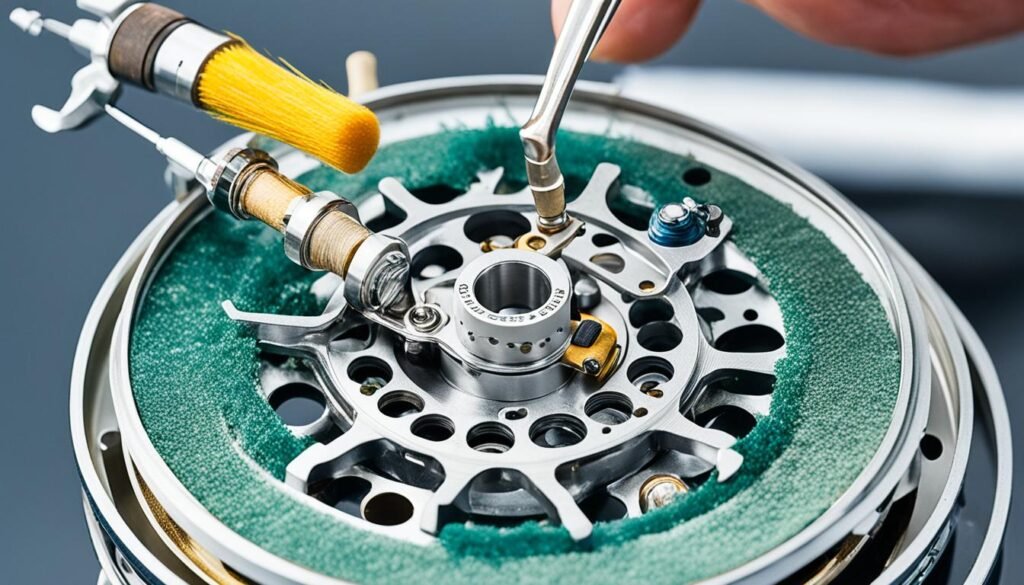
Conclusion
Preventing saltwater corrosion on fly reels is essential for maintaining gear performance and longevity. By implementing proper cleaning and maintenance techniques, such as regular freshwater rinsing, thorough drying, and using corrosion-resistant lubricants, you can effectively protect your fly reels from the damaging effects of saltwater corrosion.
When fly fishing in saltwater environments, salt, grime, and sand can accumulate on your gear, leading to rust and corrosion. To combat this, remember to rinse your fly reel and rod with freshwater after each saltwater fishing trip. Pay close attention to the ferrules and reel seats, as they are particularly vulnerable to salt buildup. Drying your gear thoroughly and storing it in a clean, dry area helps prevent corrosion.
Using a soapy solution when cleaning your fly reel can be effective in breaking down salt and contaminants, but plain freshwater rinsing is often sufficient. Choose the cleaning method that best suits your preferences and the level of contamination on your reel.
Lastly, maintaining a regular cleaning and lubrication schedule is crucial for ensuring the longevity and optimal performance of your fly reels. Washing your fly rod with soap and water, lubricating moving parts, and storing your gear properly all contribute to preventing saltwater corrosion and preserving the quality of your saltwater fly fishing experiences.
FAQ
How often should I rinse my fly reel with freshwater?
It is essential to rinse your fly reel with freshwater after every saltwater fishing trip to prevent salt buildup and corrosion.
Which parts of the fly rod should I pay extra attention to when rinsing?
When rinsing your fly rod, pay close attention to the ferrules (where the rod sections join) and the reel seat as these areas are particularly vulnerable to salt, grime, and sand buildup.
How should I dry my fly reel and rod after rinsing?
Use a towel to remove excess water from the fly reel and rod, then bring them indoors to a clean and dry area. Separating the reel parts and propping the rod sections up against a wall allows any trapped water to drip out and helps prevent corrosion.
Is it necessary to use a soapy solution when washing my fly reel?
While some anglers use a soapy solution to effectively break down salt and contaminants on fly reels, plain freshwater rinsing can also be sufficient for cleaning the gear. The choice depends on personal preference and the level of contamination on the reel.
How often should I rinse all my fishing gear with freshwater?
Rinse all your gear, including reels, rods, and terminal tackle, with freshwater after every saltwater fishing trip to remove salt and prevent corrosion. Regular maintenance is key to extending the life of your fishing tackle.
Why is it essential to wash my fly rod with soap and water after saltwater fishing?
Washing your fly rod with soap and fresh water after saltwater fishing helps remove any salty residue that can lead to corrosion on the guides and reel seats. Washing the rod sock as well ensures that no salt residue remains to contaminate the freshly cleaned rod.
How can I extend the life of my fly reel?
Good maintenance practices, including regular cleaning and lubrication, are critical to keeping your fly reel in perfect working order. Developing a maintenance schedule and using high-quality lubricants with anti-corrosion properties helps prevent saltwater corrosion and ensures your reel performs at its best.
How can I effectively protect my fly reel from saltwater corrosion?
Following proper cleaning and maintenance techniques, such as freshwater rinsing, thorough drying, and using the right lubricants, can effectively protect your fly reel from saltwater corrosion and ensure it lasts longer.

